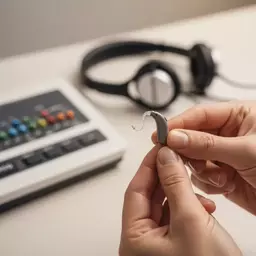Taking care of your hearing health is not just about protecting your ears; it's about enhancing your overall well-being. With 1 in 8 people experiencing some degree of hearing loss, understanding the causes and prevention methods is more important than ever. How proactive are you about your auditory health? Let's explore some key insights that can empower you on this journey.
What You Will Learn
- Hearing loss can lead to significant social and cognitive challenges, including isolation and increased risk of dementia.
- Lifestyle changes, such as a balanced diet and regular exercise, play a crucial role in maintaining hearing health.
- Awareness of risk factors like aging, loud noise exposure, and chronic diseases can help in preventing hearing loss.
- Regular check-ups with an audiologist are essential for early detection and effective management of hearing health.
Key Aspects of Hearing Health: A Visual Summary
This visual highlights the critical factors influencing hearing health and the proactive steps individuals can take for prevention and well-being.
Prevalence & Impact
Approximately 1 in 8 people in the US experience some degree of hearing loss.
- Linked to cognitive decline
- Increased social withdrawal
- Communication difficulties
Key Risk Factors
- Aging: Natural wear and tear
- Loud Noise Exposure: Damages inner ear hair cells
- Genetics: Family history influence
- Chronic Diseases: e.g., Diabetes
Lifestyle Changes for Prevention
- Balanced Diet (omega-3s, antioxidants)
- Regular Physical Activity
- Avoid Smoking & Excessive Alcohol
- Stress Management (meditation, yoga)
Proactive Next Steps
- Regular Audiologist Check-ups
- Consider Hearing Aids/Assistive Devices
- Join Community Support Groups
- Stay Informed on advancements
Understanding Hearing Loss: Causes and Prevention
Hearing loss is a common yet often misunderstood condition that affects many individuals, encompassing a wide range of ages and backgrounds. In fact, studies show that approximately 1 in 8 people in the United States experience some degree of hearing loss. Recognizing the impact of hearing loss on overall well-being is crucial for those affected and their families. It can lead to feelings of isolation, frustration, and even depression, which is why understanding its causes and prevention methods is so important.
At HearWise Living, we believe that awareness and education are the first steps in addressing hearing health. By exploring the various factors that contribute to hearing loss, we can empower ourselves and our loved ones to take proactive measures to maintain our hearing health. If you've ever wondered about how your lifestyle choices might affect your auditory well-being, you're in the right place! For those seeking professional help, consider finding local audiology services.
The Prevalence of Hearing Loss and Its Impact on Well-being
It's vital to recognize how widespread hearing loss really is. The impact of this condition reaches far beyond just the inability to hear sounds; it can affect relationships, communication, and even one’s mental health. Here are some key points to consider:
- Hearing loss can lead to social withdrawal and loneliness.
- It has been linked to cognitive decline and increased risk of dementia.
- Many individuals with hearing loss experience difficulty in professional and personal communication.
Addressing these issues early on can lead to better outcomes, allowing individuals to remain socially engaged and mentally sharp. So, what can we do to mitigate these risks? The answer lies in understanding our lifestyle choices and how they affect our hearing health.
Recognizing the Importance of Lifestyle Changes for Hearing Health
Making informed lifestyle choices can significantly improve your hearing health. It’s not just about avoiding loud noises; it involves a holistic approach to wellness. Here are a few lifestyle changes you might consider:
- Maintain a balanced diet rich in nutrients.
- Incorporate regular physical activity into your routine.
- Avoid smoking and limit alcohol consumption.
- Manage stress effectively through mindfulness and relaxation techniques.
By embracing these changes, you can create a supportive environment for your hearing health. Making small adjustments in daily habits can lead to significant improvements over time. Remember, at HearWise Living, we’re here to guide you on this journey! If you're looking for support, finding local hearing loss support can be incredibly beneficial.
Exploring Risk Factors Contributing to Hearing Loss
Certain risk factors can elevate the likelihood of developing hearing loss. Understanding these factors can help you take preventive measures. Some common risk factors include:
- Aging – Natural wear and tear on the auditory system.
- Exposure to loud noise – Consistent exposure can damage hair cells in the inner ear.
- Genetic predisposition – Family history plays a role in hearing health.
- Chronic diseases – Conditions like diabetes can affect hearing.
Being aware of these risk factors allows you to take proactive steps toward reducing your chances of hearing loss. By staying informed and making conscious choices, we can all work towards maintaining our auditory health and enhancing our quality of life.
Pro Tip
Did you know that staying hydrated can positively impact your hearing health? Dehydration can affect the fluid balance in your inner ear, potentially leading to hearing issues. Aim to drink at least 8 glasses of water a day to support your overall wellness and keep your auditory system functioning optimally!
Summarizing Key Lifestyle Changes for Hearing Health
When it comes to enhancing your hearing health, lifestyle changes can make a significant difference. These adjustments don’t have to be overwhelming; in fact, they can be simple and enjoyable! From adopting a nutritious diet to staying active, every small step counts towards better hearing and overall well-being.
Let’s take a closer look at some actionable insights to help you implement these changes in your daily life:
- Incorporate more omega-3 fatty acids by enjoying fish like salmon and walnuts.
- Limit exposure to loud environments and always wear ear protection when necessary.
- Engage in regular physical activity—something as simple as walking can boost your circulation!
- Practice stress management techniques, like meditation or yoga, to promote overall health.
Making these changes not only supports your hearing but also enriches your daily experiences. Remember, it’s about consistency! Aim to make small adjustments and gradually build healthier habits that will support your auditory health and enhance your quality of life.
Actionable Insights for Daily Implementation
Now that we know some key lifestyle changes, how can we incorporate them into our daily routines? Here are a few strategies that I’ve found helpful:
- Start your day with a healthy breakfast rich in antioxidants, such as berries or spinach smoothies.
- Set reminders to take short breaks from screens to prevent fatigue and allow your ears to rest.
- Join a local walking group to combine social engagement with physical activity.
- Keep a journal to track your hearing health progress and note any changes you observe.
By integrating these insights into your everyday life, you'll be taking proactive steps towards better hearing. It’s the perfect time to start, and remember, every little effort counts!
Long-Term Commitment: Maintaining Healthy Hearing Routines
Just like any health journey, maintaining these habits requires commitment. At HearWise Living, we believe that consistency is key to long-term hearing health. Here are some tips for staying on track:
- Set specific, achievable goals for yourself and celebrate your progress.
- Schedule regular check-ins with an audiologist to monitor your hearing health.
- Engage with community support groups or online forums where you can share experiences and tips.
- Educate yourself continually about hearing loss and its prevention—knowledge is power! For those interested in technology solutions, explore hearing aid innovations for 2025.
By committing to these routines, you’ll not only protect your hearing but also foster a healthier lifestyle that benefits your overall well-being.
Frequently Asked Questions (FAQs)
What are the main causes of hearing loss?
The main causes of hearing loss include aging, exposure to loud noise, genetic predisposition, and chronic diseases like diabetes.
How does hearing loss impact overall well-being?
Hearing loss can lead to social withdrawal, loneliness, communication difficulties, and has been linked to cognitive decline and an increased risk of dementia.
What lifestyle changes can help prevent hearing loss?
Key lifestyle changes include maintaining a balanced diet rich in omega-3s and antioxidants, regular physical activity, avoiding smoking and excessive alcohol, and practicing stress management techniques.
Why are regular audiologist check-ups important?
Regular check-ups and audiometric testing are essential for early detection of hearing changes, effective management strategies, and tracking the progression of your hearing health over time.
How can community support help individuals with hearing loss?
Community engagement, such as joining support groups, workshops, or online forums, provides a platform to share experiences, gain support, and stay informed about hearing health advancements, helping to combat feelings of isolation.
Encouraging Proactive Measures for Hearing and Overall Well-being
Taking a proactive approach to your hearing health can lead to profound benefits. Whether you’re experiencing hearing loss or just looking to maintain your auditory health, integrating preventive measures into your daily life is essential.
Let’s explore some next steps that can help you personalize your hearing health journey.
Next Steps: Personalizing Your Hearing Health Journey
Personalizing your approach to hearing health begins with understanding your unique needs and challenges. Here are some steps you can take:
- Consult with an audiologist to discuss your specific hearing challenges and goals.
- Explore hearing aids or assistive listening devices if you find you need extra support.
- Join HearWise Living's community to share experiences and gather insights from others.
- Stay informed about new research and advancements in hearing technology.
By tailoring your journey to fit your lifestyle and preferences, you empower yourself to make lasting changes!
Inviting Community Engagement and Support Resources
Community engagement plays a vital role in supporting your hearing health. At HearWise Living, we encourage you to connect with others who are on similar journeys. Here are some ways to engage:
- Participate in local workshops or seminars on hearing health.
- Follow online forums or social media groups focused on hearing wellness.
- Share your story and tips on how you manage hearing challenges to inspire others.
By fostering connections with others, you not only gain support but also help build a community that values hearing health.
Importance of Regular Check-Ups and Audiometric Testing
Regular check-ups are essential for maintaining hearing health. By scheduling audiometric tests, you can catch any changes early, ensuring you get the support you need. Here’s why regular check-ups matter:
- Early detection of hearing loss can lead to more effective management strategies.
- Routine tests help you track the progression of your hearing health over time.
- They provide an opportunity to discuss any concerns or changes in your hearing experience.
Don’t hesitate to reach out to an audiologist for your regular check-ups. Remember, taking care of your hearing is an essential part of your overall wellness journey!
Recap of Key Points
Here is a quick recap of the important points discussed in the article:
- Hearing loss affects approximately 1 in 8 people in the United States and can lead to social withdrawal and cognitive decline.
- Lifestyle changes such as a balanced diet, regular exercise, and stress management can significantly improve hearing health.
- Common risk factors for hearing loss include aging, exposure to loud noise, genetic predisposition, and chronic diseases.
- Regular audiometric testing and consultations with audiologists are essential for early detection and effective management of hearing health.
- Community engagement and shared experiences can provide support and encouragement in maintaining hearing health.








